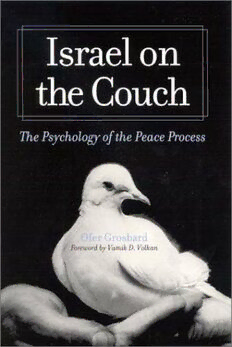
Israel on the Couch: The Psychology of the Peace Process PDF
Preview Israel on the Couch: The Psychology of the Peace Process
Grosbard:Israel on the Couch page A Words of praise for Israel on the Couch: I found your book to be very interesting. It offers important insights into the issues facing Israeli society following the peace process. The psychological analysis you offer leads to several conclusions which could encourage Israeli public opinion to support the peace process, despite possible difficulties. —Shimon Peres Your book is a must for the peace negotiators. —Meir Sheetrit, Member of the Knesset for Likud Your innovative book sheds light on the Israeli-Arab conflict from a very different angle. The prism through which you view the situation offers a new approach. —Avraham Burg, Knesset Speaker I am sure this book will help decision-makers try to understand the other side better. —Ofir Pines, Chairman of One Israel, Chairman of the Coalition I was impressed by the book’s original and singular approach to the peace process. The use of the analytical tools you suggest could help decision-makers shape better solutions to the components of the conflict. —Yossi Beilin, Minister of Justice The material is fascinating and interesting. I thank you for the original thinking. I will do my best to give your ideas resonance. —Shlomo Ben-Ami, Minister of Internal Security Such a book makes a singular contribution by highlighting the pyschological aspects of the human processes, which we tend to overlook. Undoubtedly, even in the peace process with our neighbors the psychological element is decisive. —David Levy, Minister of Foreigh Affairs Grosbard:Israel on the Couch page B Grosbard:Israel on the Couch page i Israel on the Couch Grosbard:Israel on the Couch page ii SUNY series in Israeli Studies Russell Stone, editor Grosbard:Israel on the Couch page iii Israel on the Couch The Psychology of the Peace Process Ofer Grosbard with a Foreword by Vamik D. Volkan State University of New York Press Grosbard:Israel on the Couch page iv This work was translated from the Hebrew by Shosh Sappir. Published by State University of New York Press, Albany © 2003 State University of New York All rights reserved Printed in the United States of America No part of this book may be used or reproduced in any manner whatsoever without written permission. No part of this book may be stored in a retrieval system or transmitted in any form or by any means including electronic, electrostatic, magnetic tape, mechanical, photocopying, recording, or other- wise without the prior permission in writing of the publisher. For information, address State University of New York Press, 90 State Street, Suite 700, Albany, NY 12207 Production by Michael Haggett Marketing by Fran Keneston Library of Congress Cataloging-in-Publication Data Grosbard, Ofer, 1954– Israel on the Couch: the psychology of the peace process / Ofer Grosbard; with a foreword by Vamik D. Volcan. p. cm Includes bibliographical references and index. 0-7914-5605-6 (alk. paper) — 0-7914-5606-4 (pbk.: alk. paper) 1. Arab-Israeli conflict—Psychological aspects. 2. Peace—Psychological aspects. 3. Political psychology. 4. National characteristics, Israeli. I. Title. . 956.05'3—dc21 2002030975 10 9 8 7 6 5 4 3 2 1 Grosbard:Israel on the Couch page v In memory of my father David Grosbard A member of Etzel’s chief command, Tel Aviv District Commander, Who taught me to experience our national life As if it were my own. Grosbard:Israel on the Couch page viblank Grosbard:Israel on the Couch page vii Contents Foreword by Vamik D. Volkan ix Preface xiii Introduction 1 1 The Jewish People 9 2 The Dynamic of the Peace Process 19 The Peace Process: A Business Negotiation or an Emotional Bond? 19 The Peace Process as a Process of Emotional Growth 23 Emotional Resistance to the Peace Process 31 The Whole World Is Against Us 35 Denial of Aggression and Fear, and Its Price 44 Is Our Sense of Reality Valid? 52 3 The Stories We Tell Ourselves, and the World, about Ourselves 63 The National Anthem 63 4 Foreign Affairs 67 Syria 67 Lebanon 76 The Palestinian Refugees 87 A Palestinian State 93 Murderers or Heroes? 113 5 The Arabs and Us—an Intersubjective Approach 122 Arab Insult 122 Arab Thinking 130 Speaking to Arabs 146 vii
